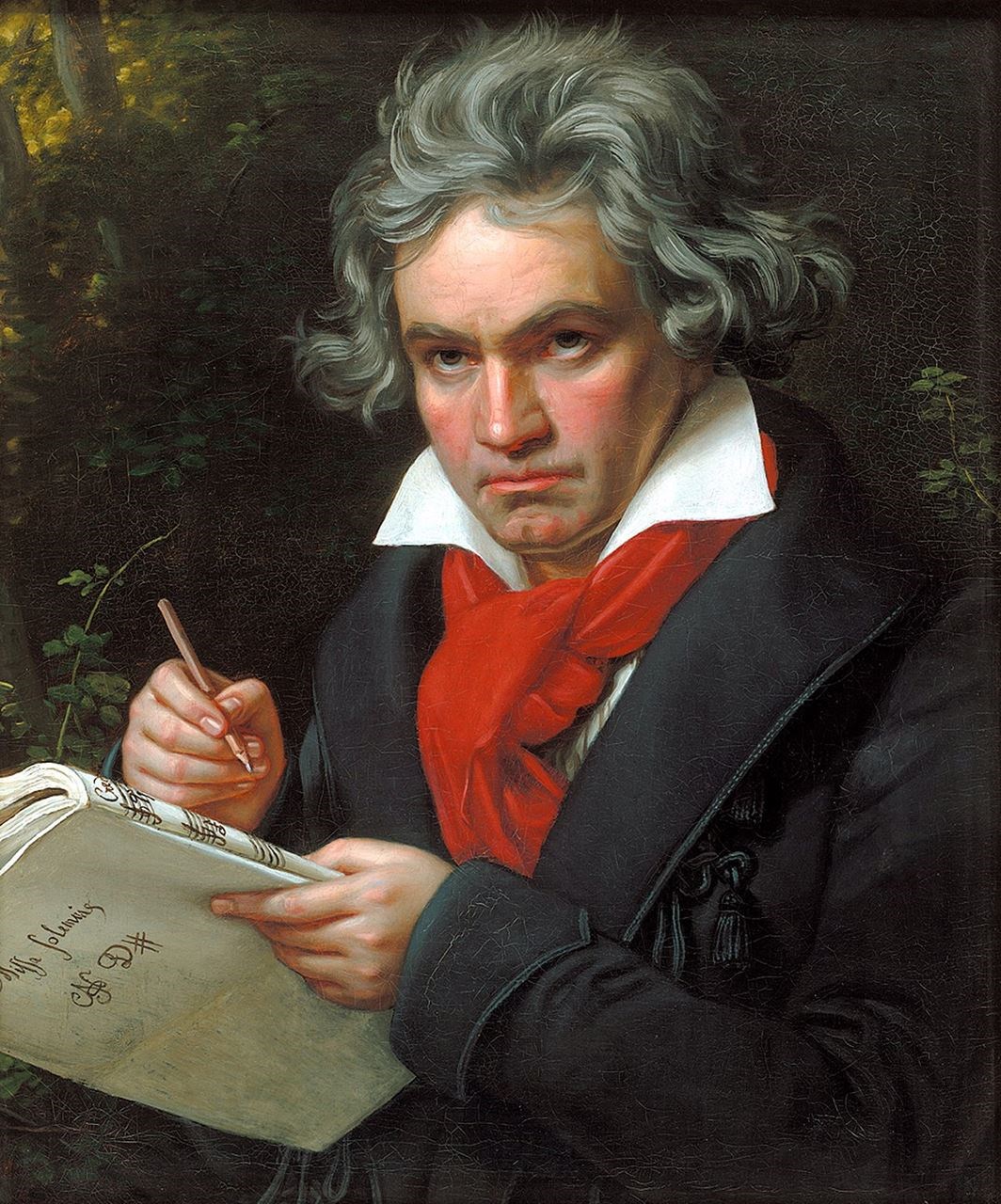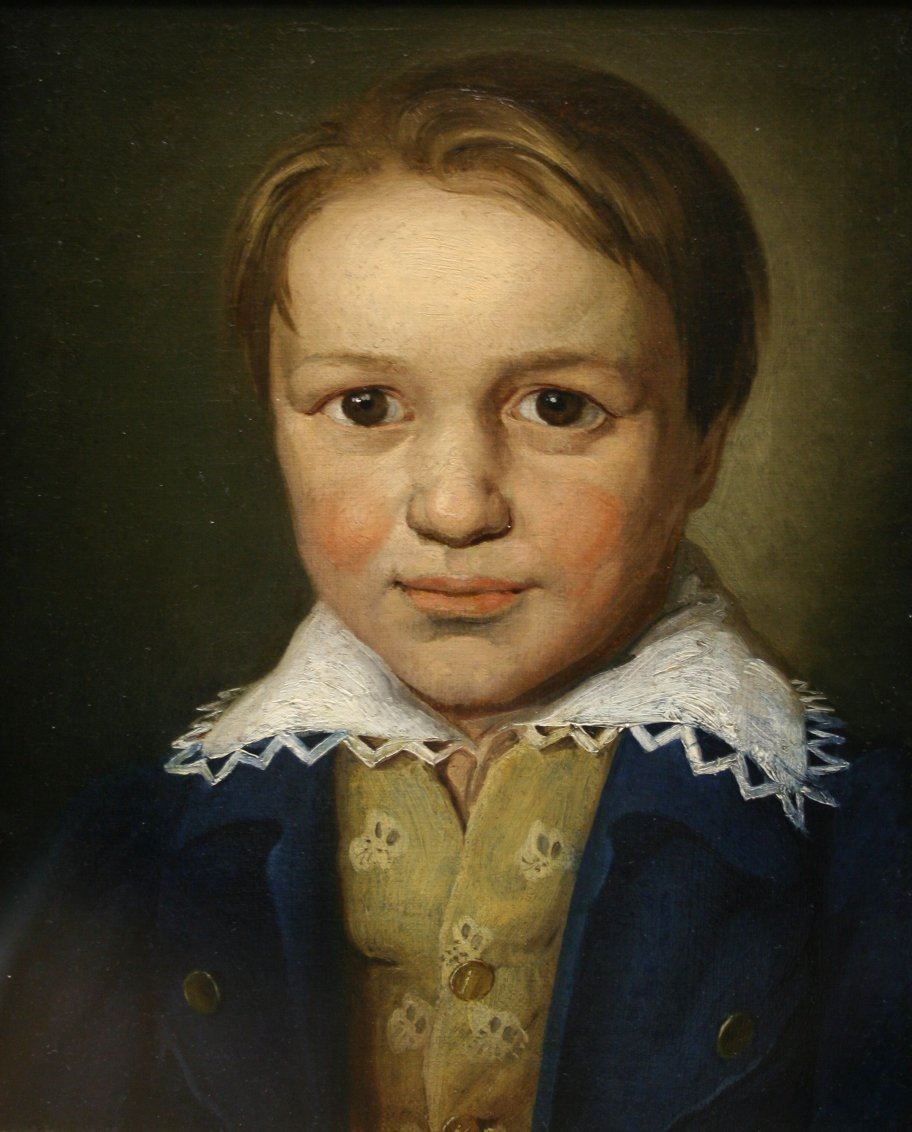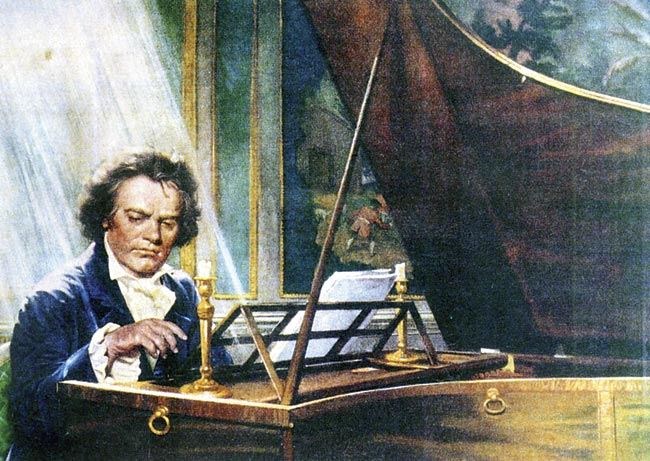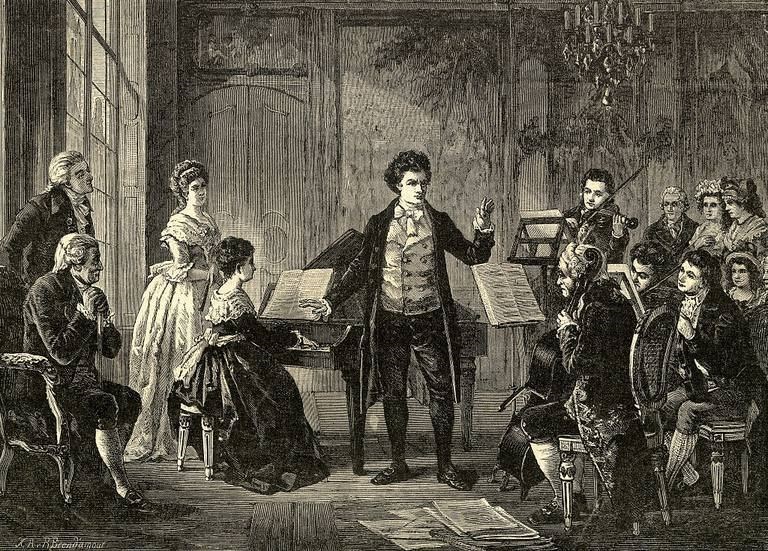 This is one of the most famous photos of Ludwig Van Beethoven and is commonly used in websites, articles, and more.https://en.wikipedia.org/wiki/Ludwig_van_Beethoven“A hero is someone who rises above his or her fears and limitations to achieve something extraordinary… a hero embodies what we believe is the best in ourselves” (Fingeroth). As illustrated by Danny Fingeroth in the article “Superman on the Couch: What Superheroes Really Tell Us About Ourselves,” a hero does not have to be someone who has the ability to fly or teleport; a hero is someone who rises above their obstacles and roadblocks to achieve something remarkable while portraying traits that people wish to see in themselves. Heroism can be found in an ordinary student leading a class discussion, an inspirational speaker giving his or her audience a touching presentation, and even an everyday teenager standing up for what he or she believes in. These people may not hold a dominant position in the world, but they are doing great things just like some of the people with more aptitude. Whether they are impacting hundreds of people or just one, they possess traits that society values and have a desire to change the world for the greater good. Even though none of them are faced with situations where they need to go out and save the world, they each demonstrate traits that all heroes should retain: being a role model as well as being passionate and determined. A person who is worthy to be labeled as a hero is someone who is an excellent example of a leader and role model as well as strong-willed and eager to fight to make their goals into a reality, no matter their status.
This is one of the most famous photos of Ludwig Van Beethoven and is commonly used in websites, articles, and more.https://en.wikipedia.org/wiki/Ludwig_van_Beethoven“A hero is someone who rises above his or her fears and limitations to achieve something extraordinary… a hero embodies what we believe is the best in ourselves” (Fingeroth). As illustrated by Danny Fingeroth in the article “Superman on the Couch: What Superheroes Really Tell Us About Ourselves,” a hero does not have to be someone who has the ability to fly or teleport; a hero is someone who rises above their obstacles and roadblocks to achieve something remarkable while portraying traits that people wish to see in themselves. Heroism can be found in an ordinary student leading a class discussion, an inspirational speaker giving his or her audience a touching presentation, and even an everyday teenager standing up for what he or she believes in. These people may not hold a dominant position in the world, but they are doing great things just like some of the people with more aptitude. Whether they are impacting hundreds of people or just one, they possess traits that society values and have a desire to change the world for the greater good. Even though none of them are faced with situations where they need to go out and save the world, they each demonstrate traits that all heroes should retain: being a role model as well as being passionate and determined. A person who is worthy to be labeled as a hero is someone who is an excellent example of a leader and role model as well as strong-willed and eager to fight to make their goals into a reality, no matter their status.
 In this photo, Beethoven was at the young age of 13. https://commons.wikimedia.org/wiki/File:Thirteen-year-old_Beethoven.jpgA man who possesses these traits has been in people’s lives one way or another. This man is Ludwig Van Beethoven. Beethoven was a German pianist and composer, considered the greatest of all time, whose innovative compositions combined vocals and instruments. This widened people’s outlook on sonatas, symphonies, concertos, and quartets. Along with that, he is the crucial transitional figure connecting the Classical and Romantic ages of Western music. He was born into a family of musicians; His grandfather worked as a court singer for the Elector of Cologne, and Ludwig's father, Johann, followed in his footsteps. Because of this, Beethoven was introduced to music and instruments at a very young age. Due to the destruction of his birth certificate, no one is certain about the day of his birth. By using clues such as the date of his baptism, however, it is likely that Beethoven was born on 16 December 1770 in Bonn, Germany. His father’s goal had always been for him to become a child prodigy much like Mozart. Because of this, Beethoven began playing the clavier, a keyboard like-instrument, and the violin from the age of four. He gave his first public performance at the age of eight, and in 1781, at the age of 10, Beethoven withdrew from school to study music full time. It was at about this age that Beethoven surpassed his father’s ability to teach him and therefore moved on to study with others who were more experienced. In 1783, Beethoven published his first work. In the following years, he continued to earn a living as a musician. At the age of 12, he was a promising keyboard virtuoso and a talented pupil. He traveled to Vienna, Austria in 1792 to study with Franz Joseph Haydn, who was among the creators of the fundamental genres of classical music. In 1798, at the age of 26, Beethoven began to hear buzzing and other weird noises throughout his days. He then started to go deaf in 1798 and lost 60% of his hearing by 1801 at the age of 31. As time continued, his condition only got worse. In 1816, ten years before his death, Beethoven had gone completely deaf. Although he had lost his hearing, he continued to compose music. In fact, some of his most significant works were written during the final ten years of his life. He continued to produce music until 26 March 1827 at the age of 56 when he passed away due mainly to posthepatitic cirrhosis of the liver. Beethoven’s heroism is not only displayed by his outstanding passion and determination towards the art of music and composing, but he also demonstrated traits of someone who could be looked up to and admired as a role model.
In this photo, Beethoven was at the young age of 13. https://commons.wikimedia.org/wiki/File:Thirteen-year-old_Beethoven.jpgA man who possesses these traits has been in people’s lives one way or another. This man is Ludwig Van Beethoven. Beethoven was a German pianist and composer, considered the greatest of all time, whose innovative compositions combined vocals and instruments. This widened people’s outlook on sonatas, symphonies, concertos, and quartets. Along with that, he is the crucial transitional figure connecting the Classical and Romantic ages of Western music. He was born into a family of musicians; His grandfather worked as a court singer for the Elector of Cologne, and Ludwig's father, Johann, followed in his footsteps. Because of this, Beethoven was introduced to music and instruments at a very young age. Due to the destruction of his birth certificate, no one is certain about the day of his birth. By using clues such as the date of his baptism, however, it is likely that Beethoven was born on 16 December 1770 in Bonn, Germany. His father’s goal had always been for him to become a child prodigy much like Mozart. Because of this, Beethoven began playing the clavier, a keyboard like-instrument, and the violin from the age of four. He gave his first public performance at the age of eight, and in 1781, at the age of 10, Beethoven withdrew from school to study music full time. It was at about this age that Beethoven surpassed his father’s ability to teach him and therefore moved on to study with others who were more experienced. In 1783, Beethoven published his first work. In the following years, he continued to earn a living as a musician. At the age of 12, he was a promising keyboard virtuoso and a talented pupil. He traveled to Vienna, Austria in 1792 to study with Franz Joseph Haydn, who was among the creators of the fundamental genres of classical music. In 1798, at the age of 26, Beethoven began to hear buzzing and other weird noises throughout his days. He then started to go deaf in 1798 and lost 60% of his hearing by 1801 at the age of 31. As time continued, his condition only got worse. In 1816, ten years before his death, Beethoven had gone completely deaf. Although he had lost his hearing, he continued to compose music. In fact, some of his most significant works were written during the final ten years of his life. He continued to produce music until 26 March 1827 at the age of 56 when he passed away due mainly to posthepatitic cirrhosis of the liver. Beethoven’s heroism is not only displayed by his outstanding passion and determination towards the art of music and composing, but he also demonstrated traits of someone who could be looked up to and admired as a role model.
Throughout his lifetime, Beethoven was an admired man who anyone could look up to due to the traits, such as selflessness, that he acquired. Beethoven exhibited his benevolence when he took in his nephew Karl and treated him as if he were his son: “...in letters to Karl, he addressed him as ‘Dear Son!’and signed the letter ‘Your faithful father’” (Suchet 289). Beethoven wanted to make sure that his nephew was living a good life after his father passed away. Like a true hero, Beethoven did not let his large workload alter his decision and, due to his selflessness, was instead determined to take care of Karl. Along with that, Beethoven demonstrated that he puts others’ needs before his own when he agreed to assist his friend at an event even though he was not doing very well: “Rode was not quite correct in all that he said of me; my health is not particularly good, and from no fault of my own,--my present condition being the most unfortunate of my life. But neither this nor anything in the world shall prevent me from assisting…” (Beethoven). Beethoven’s health was at the worst it had ever been in his lifetime, yet he was set on assisting his companion at the event he had planned and even provided him with pieces that could be played. By doing this, he is demonstrating admirable traits, including selflessness and generosity, that the people of society, both then and now, cherish and hope to follow the example of. Beethoven, an admirable figure who was a role model to people in his time and in modern time, put others’ needs before his own, which is something that was, and still is, treasured very much.
 Beethoven at the piano, an instrument he is commonly known for playing.https://www.mid-day.com/articles/beethoven-s-was-a-tempestuous-interesting-life/15415197By following his passion and remaining determined towards his music, Beethoven shows people the value of hard work and pushing beyond life’s curveballs. Beethoven validated his love for composing when he continued to work harder than he ever had before, even when he was having trouble with his hearing. “Almost miraculously, despite his rapidly progressing deafness, Beethoven continued to compose at a furious pace. From 1803 to 1812, what is known as his ‘middle’ or ‘heroic' period, he composed an opera, six symphonies, four solo concerti, five string quartets, six string sonatas, seven piano sonatas, five sets of piano variations, four overtures, four trios, two sextets and 72 songs” (Washington). Although he was facing the worst possible situation for a musician and composer, Beethoven pushed through and continued to do what he loved rapidly. His passion for the art of music shone beyond everything else he was facing and led to his heroic period, despite his gradual progression towards deafness. Not only did he produce a vast quantity of works, he made sure each one was written to the best of his ability: “...despite extreme depression into which he had sunk so recently, and considering the traumatic events that had surrounded the first two productions of his opera, he not only agreed to rework it, but did so with gusto…” (Suchet 238). Despite Beethoven’s depression and previous trauma, he was determined to achieve his goal: the success of his opera. Beethoven did and would not stop trying until he got there, no matter the horrible experiences that he went through previously due to it. His determination to achieve his goal was more prominent than the problems he was facing and pushed him to get what he wanted instead of backing away due to his struggles. Being the passionate and determined man that he was, Beethoven would not let anything stop him from achieving what he wanted most: to compose good music.
Beethoven at the piano, an instrument he is commonly known for playing.https://www.mid-day.com/articles/beethoven-s-was-a-tempestuous-interesting-life/15415197By following his passion and remaining determined towards his music, Beethoven shows people the value of hard work and pushing beyond life’s curveballs. Beethoven validated his love for composing when he continued to work harder than he ever had before, even when he was having trouble with his hearing. “Almost miraculously, despite his rapidly progressing deafness, Beethoven continued to compose at a furious pace. From 1803 to 1812, what is known as his ‘middle’ or ‘heroic' period, he composed an opera, six symphonies, four solo concerti, five string quartets, six string sonatas, seven piano sonatas, five sets of piano variations, four overtures, four trios, two sextets and 72 songs” (Washington). Although he was facing the worst possible situation for a musician and composer, Beethoven pushed through and continued to do what he loved rapidly. His passion for the art of music shone beyond everything else he was facing and led to his heroic period, despite his gradual progression towards deafness. Not only did he produce a vast quantity of works, he made sure each one was written to the best of his ability: “...despite extreme depression into which he had sunk so recently, and considering the traumatic events that had surrounded the first two productions of his opera, he not only agreed to rework it, but did so with gusto…” (Suchet 238). Despite Beethoven’s depression and previous trauma, he was determined to achieve his goal: the success of his opera. Beethoven did and would not stop trying until he got there, no matter the horrible experiences that he went through previously due to it. His determination to achieve his goal was more prominent than the problems he was facing and pushed him to get what he wanted instead of backing away due to his struggles. Being the passionate and determined man that he was, Beethoven would not let anything stop him from achieving what he wanted most: to compose good music.
 This photo is well known and shows Ludwig Van Beethoven conducting an orchestra. https://www.thoughtco.com/profile-of-ludwig-van-beethoven-2456098Because of the attributes that made him a role model as well as his fascination towards music and the determination to pursue his dream, Beethoven is a real hero. Beethoven was not only living his dream as a composer but was also making sure his peers were flourishing and that their needs were met. He did not let his health or the loss of his hearing stop him from assisting his companions or seeking to achieve his goal of maintaining his career as a composer. Not only was Beethoven a role model who had a significant desire and drive to continue doing what he loved, he was, and continues to be, an inspirational figure for many others. “Beethoven the man is still construed as a rebel, eccentric, and inherently resistant to bourgeois respectability. His bizarre behavior and seemingly uncompromising personality make him an ideal model for the artist as outsider, victim, and saint” (Botstein). This piece of text speaks of Beethoven’s “uncompromising personality” and how it “makes him an ideal model,” leading me to believe that he is an inspiration for musicians and non-musicians of all kinds. His drive and unwavering mindset have shown me that no matter what life decides to throw at me, I can work past it. Whether I’m struggling to find the right word for an essay and feel like giving up and erasing all of my writing, or scrambling to figure out the right notes in a music piece and am considering throwing my violin to the ground instead, I remember how Beethoven succeeded despite the curve-balls life pitched at him. I may not be able to think of a satisfactory word on the spot or be able to play the melody correctly on the first try, but I will eventually get there if I learn how to perform beyond the struggle just like Beethoven did. Rising above limitations and demonstrating traits that people want to see in themselves is a crucial component of heroism; it is not having super strength or the ability to read minds. When I think about Beethoven, I realize that I see what I want to see in myself in him: exemplary passion, honorable determination, and the capability to remain an influential figure.
This photo is well known and shows Ludwig Van Beethoven conducting an orchestra. https://www.thoughtco.com/profile-of-ludwig-van-beethoven-2456098Because of the attributes that made him a role model as well as his fascination towards music and the determination to pursue his dream, Beethoven is a real hero. Beethoven was not only living his dream as a composer but was also making sure his peers were flourishing and that their needs were met. He did not let his health or the loss of his hearing stop him from assisting his companions or seeking to achieve his goal of maintaining his career as a composer. Not only was Beethoven a role model who had a significant desire and drive to continue doing what he loved, he was, and continues to be, an inspirational figure for many others. “Beethoven the man is still construed as a rebel, eccentric, and inherently resistant to bourgeois respectability. His bizarre behavior and seemingly uncompromising personality make him an ideal model for the artist as outsider, victim, and saint” (Botstein). This piece of text speaks of Beethoven’s “uncompromising personality” and how it “makes him an ideal model,” leading me to believe that he is an inspiration for musicians and non-musicians of all kinds. His drive and unwavering mindset have shown me that no matter what life decides to throw at me, I can work past it. Whether I’m struggling to find the right word for an essay and feel like giving up and erasing all of my writing, or scrambling to figure out the right notes in a music piece and am considering throwing my violin to the ground instead, I remember how Beethoven succeeded despite the curve-balls life pitched at him. I may not be able to think of a satisfactory word on the spot or be able to play the melody correctly on the first try, but I will eventually get there if I learn how to perform beyond the struggle just like Beethoven did. Rising above limitations and demonstrating traits that people want to see in themselves is a crucial component of heroism; it is not having super strength or the ability to read minds. When I think about Beethoven, I realize that I see what I want to see in myself in him: exemplary passion, honorable determination, and the capability to remain an influential figure.
Botstein, and Leon. “Why Beethoven? | The Musical Quarterly | Oxford Academic.” OUP Academic, Oxford University Press, 3 Jan. 2011, academic.oup.com/mq/article/93/3-4/361/1046003.
Suchet, John. Beethoven: The Man Revealed. Elliott and Thompson Limited, 2012.
“Superman on the Couch: What Superheroes Really Tell Us about Ourselves and Our Society.” Choice Reviews Online, vol. 42, no. 01, Jan. 2004, doi:10.5860/choice.42-0069.
Wallace, Lady. “BEETHOVEN'S LETTERS.” BEETHOVEN'S LETTERS. (1790--1826.) VOL. I., PROJECT GUTENBERG EBOOK BEETHOVEN'S LETTERS, 31 July 2004, https://www.gutenberg.org/files/13065/13065-h/13065-h.htm
Washington, Kerry. “Ludwig Van Beethoven.” Biography.com, A&E Networks Television, 5 Sept. 2017, www.biography.com/people/ludwig-van-beethoven-9204862.
Page created on 5/30/2018 12:29:56 AM
Last edited 9/2/2021 10:38:33 PM
